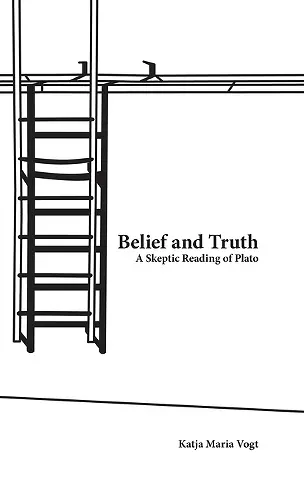Belief and Truth
A Skeptic Reading of Plato
Format:Hardback
Publisher:Oxford University Press Inc
Published:20th Sep '12
Currently unavailable, and unfortunately no date known when it will be back

Katja Maria Vogt's Belief and Truth: A Skeptic Reading of Plato explores a Socratic intuition about the difference between belief and knowledge. Beliefs -- doxai -- are deficient cognitive attitudes. In believing something, one accepts some content as true without knowing that it is true; one holds something to be true that could turn out to be false. Since our actions reflect what we hold to be true, holding beliefs is potentially harmful for oneself and others. Accordingly, beliefs are ethically worrisome and even, in the words of Plato's Socrates, "shameful." As Vogt argues, this is a serious philosophical proposal and it speaks to intuitions we are likely to share. But it involves a notion of belief that is rather different from contemporary notions. Today, it is a widespread assumption that true beliefs are better than false beliefs, and that some true beliefs (perhaps those that come with justifications) qualify as knowledge. Socratic epistemology offers a genuinely different picture. In aiming for knowledge, one must aim to get rid of beliefs. Knowledge does not entail belief -- belief and knowledge differ in such important ways that they cannot both count as kinds of belief. As long as one does not have knowledge, one should reserve judgment and investigate by thinking through possible ways of seeing things. According to Vogt, the ancient skeptics and Stoics draw many of these ideas from Plato's dialogues, revising Socratic-Platonic arguments as they see fit. Belief and Truth retraces their steps through interpretations of the Apology, Ion, Republic, Theaetetus, and Philebus, reconstructs Pyrrhonian investigation and thought, and illuminates the connections between ancient skepticism and relativism, as well as the Stoic view that beliefs do not even merit the evaluations "true" and "false."
This is a stimulating book on the history of philosophy * Jan Willelm Wieland, Mind *
No other book on the subject focuses so ably on one issue while demonstrating the extent to which that issue has influenced subsequent history up to the present day. Highly recommended * G.S. Bagwell, Choiche *
This elegantly written book makes a significant contribution to current debates about ancient epistemology, by offering a series of radical new perspectives, both historical and philosophical. It deploys a combination of skills rare among specialists in ancient philosophy. Even at their most speculative, its findings will deserve a serious hearing * David Sedley, University of Cambridge *
This book presents some of the best and most interesting work in the history of philosophy I have encountered in quite a few years. It should have real impact both on thinking about ancient philosophy and on thinking about the options available in contemporary discussions of knowledge and belief * Calvin Normore, UCLA *
This is a very exciting book.... The main ideas, of belief being widely regarded as deficient and of the Stoics and skeptics in this respect standing in the shadow of Plato, are well worth taking on board * Brian Johnson, International Philosophical Quarterly *
You cannot help but admire the lucidity with which the author addresses issues long debated by scholars * Mauro Bonazzi, Elenchos *
Vogt's interpretation of Pyrrhonian skepticism and her interpretation of Sextus' understanding of his philosophical predecessors and contemporaries are nuanced and persuasive * Deborah K. W. Modrak, Notre Dame Philosophical Reviews *
[Vogt's book] is an excellent and provocative study that offers compelling support for the notion that belief is a risky endeavour and for the sceptical inclination to opt for 'investigative attitudes that fall short of truth-claims' (p.190) ... The central intuition at work throughout is that belief is an inherently deficient doxastic state, one that we should strive to replace with the completely different state of knowledge. This is in marked contrast to a widely held contemporary view that knowledge is a species of belief ... * Harald Thorsrud, Polis *
ISBN: 9780199916818
Dimensions: 147mm x 213mm x 23mm
Weight: 437g
224 pages